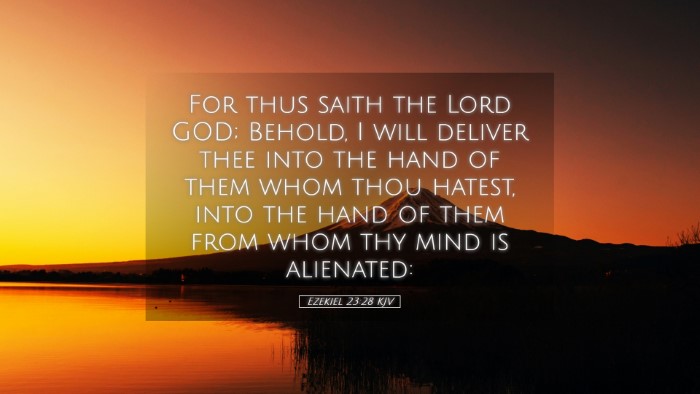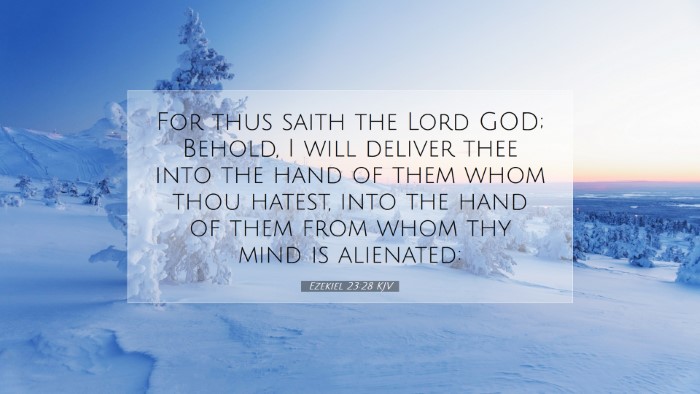Ezekiel 23:28 Commentary
Bible Verse: "For thus says the Lord God: 'Behold, I will deliver you into the hand of those whom you hate, into the hand of the Chaldeans.'" (Ezekiel 23:28)
Contextual Overview
The book of Ezekiel unfolds against the backdrop of Israel's idolatry and impending judgment. In chapter 23, we find a vivid allegorical representation of the two sister nations—Samaria and Jerusalem—personified as two women, Ohola and Oholibah. This chapter illustrates their spiritual infidelity through various relationships with surrounding nations, especially their reliance on foreign powers instead of trusting in God.
Commentary Insights
This verse, Ezekiel 23:28, marks a climactic point in the prophet's admonition. The Lord explicitly announces the coming judgment upon His people for their unfaithfulness.
Matthew Henry’s Commentary
Matthew Henry emphasizes the severity of God's declaration: the judgment is not merely a loss of favor but an active delivery into the hands of their enemies. He notes that this marks a divine retribution for their idolatry and betrayal. Henry views this as a stark warning to those who forsake divine guidance, illustrating God’s sovereignty in executing justice against unfaithfulness. He highlights the idea that they will suffer the consequences of their choices, reminding readers that disobedience to God inevitably leads to ruin.
Albert Barnes’ Commentary
Albert Barnes expounds on the significance of the "Chaldeans," a symbol of the very power that the Israelites had turned to for aid. He points out that God’s words serve as both a judgment and a reversal of Israel’s reliance on human alliances. Meanwhile, the Chaldeans, whom they once admired, would become their oppressors. Barnes suggests that this brings to light a fundamental truth about spiritual infidelity: those who seek strength outside of God will ultimately find themselves in greater bondage.
Adam Clarke’s Commentary
Adam Clarke approaches this verse with an emphasis on the divine nature of the deliverance into captivity. He highlights that God is the orchestrator of events, and this prophecy illustrates the inevitable consequences of turning away from Him. Clarke also assesses the psychological aspect of this verse, noting that the phrase "those whom you hate" speaks volumes about the conflict between their desires and their circumstances. His commentary reflects on the idea that those who are committed to destruction will harbor conflicting emotions regarding their fate.
Theological Reflections
This verse serves as an essential passage for understanding the nature of God's judgment in relation to human unfaithfulness. It challenges believers to reflect on their own lives and attitudes toward God—whether they are seeking fulfillment in fleeting worldly alliances or remaining steadfast in faith.
- The sovereignty of God: The Scripture emphasizes that God holds ultimate authority over nations and individuals. It reminds believers that they cannot escape divine judgment.
- The consequences of idolatry: Ezekiel 23:28 serves as a stark reminder of the dangers of placing trust in anything other than God. The allure of foreign 'gods' or alliances often leads to despair.
- Spiritual infidelity and its repercussions: The notion of spiritual unfaithfulness continues to resonate in contemporary discussions of faith. Modern readers can reflect on what it means to be faithful to God in a world filled with distractions and opposing ideologies.
Application for Pastors and Theologians
For pastors, this verse offers a profound opportunity to preach about the consequences of turning away from God. It serves as a reminder of divine justice and the ultimately destructive path of idolatry, thus encouraging congregations to hold fast to faithfulness.
The theologians can examine the implications of God's character conveyed through judgment. Discussions around divine sovereignty, human responsibility, and the nature of God's call to repentance are essential. This passage opens the door to meditations on the relationship between God’s justice and mercy.
Conclusion
Ezekiel 23:28 represents a powerful declaration of God's judgment against unfaithfulness. The insights from various commentaries provide a multifaceted understanding of its implications for ancient Israel and contemporary believers. Both a warning and a call to reflection, this verse urges us to evaluate the nature of our alliances—whether they are with God or the chaotic world around us. As students of the Word, it beckons each of us to embrace a commitment to fidelity in our relationship with the Lord.


